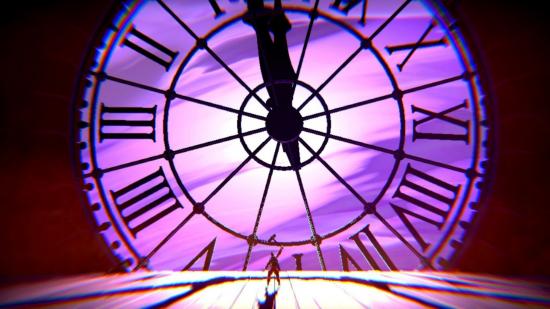Our Verdict
For all the wonderful writing and gorgeous world-building, Little Orpheus fails on a fundamental level to create anything engaging in the platforming and puzzles. There's a lot worth seeing, but it is sadly buried under monotonous gameplay.
March 2, 2022: In light of recent events, the console and Steam release of Little Orpheus has been delayed. You can find a full statement from Secret Mode on Twitter.
You begin Little Orpheus with a man being interviewed by a general. This is our protagonist, Ivan Ivanovich, a stick-thin, paper-white cosmonaut, who was tasked with trying to find the centre of the earth. When he arrived, he was meant to radio the surface, but things didn’t go quite right, and what’s more, he managed to misplace a nuclear power source called Little Orpheus.
Three years later, he’s sat in a chair, timidly convincing this general of everything that happened. He says he must explain everything from that first moment, otherwise, it won’t make sense. And so, that’s where you jump in, ready to relive every moment of his madcap adventure.
The centre of the earth is just as you’d expect at first: big bugs, giant foliage, and massive dinosaurs. This evolves though, as you travel through the belly of a whale and lost cities of giant, precursor races, as Ivan tries to convince the general that all of this actually happened. It’s so beyond belief, that even you don’t know if Ivan is telling the truth. What follows is a heartfelt tale about the power of storytelling, the magic of imagination, and whether the truth of the matter actually means anything when something is entertaining.
It’s a wonderfully put together piece of work by The Chinese Room, and puts the developer’s story chops into a more traditional medium. For all the excellent writing, vibrant world-building, and hilarious voice acting, though, there’s a gaping hole in the middle of Little Orpheus. And it’s the gameplay. Whether that hole matters or not is hard to say, as I’m glad I saw everything that it has to offer. But I also had moments of boredom that stemmed from the fact that it just isn’t a very engaging side-scroller.
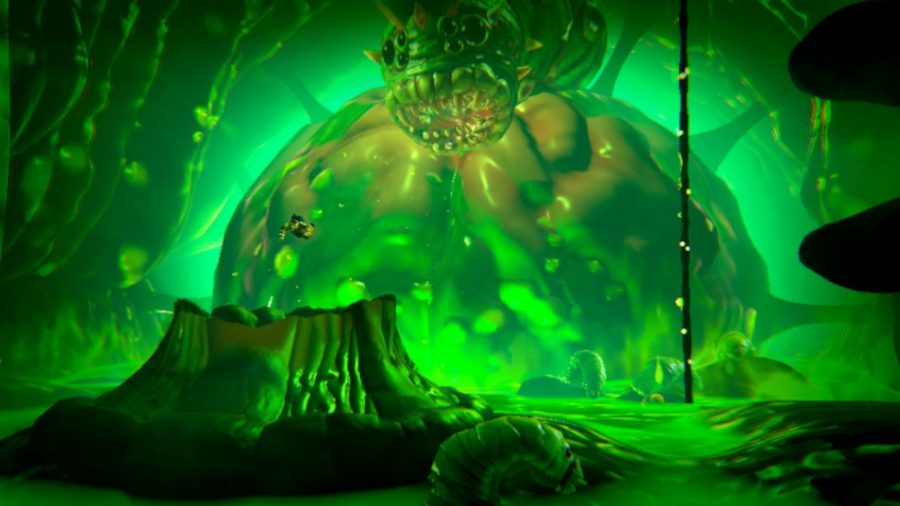
While Little Orpheus may be very simple in terms of gameplay, its first impression is very good. The game starts with a slick, Saul Bass-style title sequence that makes the game’s overall aesthetic aims immediately clear, followed by a bevy of influences littered throughout that help it feel like a long lost experience from another time. There’s Ray Harryhausen everywhere, early Soviet propaganda in the UI design, and, obviously, Journey to the Centre of the Earth in the story. These influences aren’t in charge though. Rather they’re lovingly referenced and weaved together seamlessly, while not trampling on the game’s own, distinct personality.
The gameplay consists of running, jumping, and sliding, all put to use in platforming, puzzles, and stealth. This is where Little Orpheus is most let down, as it’s all incredibly easy. However, sometimes the simplicity is outweighed by the aesthetic, best shown in the opening episode. After taking his first steps in Plutonia, Ivan comes across a massive t-rex. As he tries to avoid the dinosaur, Ivan and the general share funny dialogue from the in-game present day, expressing amusing disbelief and dry sarcasm throughout.
The sound design is pitch-perfect too. As our charmingly clumsy protagonist ends up using an eggshell as a hiding place, there are cheekily plucked strings in time with every step, alongside an endearing chuckle from Ivan. When you stop moving to stay out of sight, these strings do too. It’s enough to make the boring gameplay entertaining.
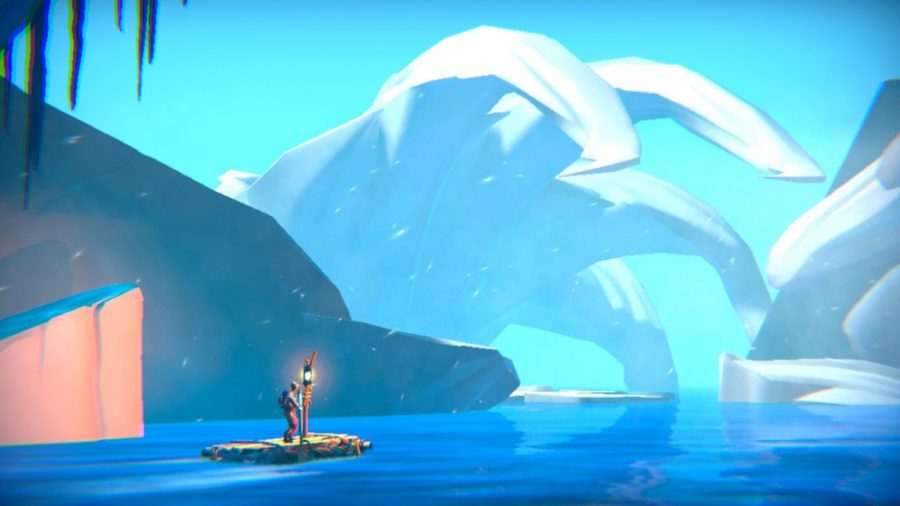
Sometimes, though, there isn’t enough. Some of my least favourite sections involve dragging a block to the other end of a room so you can climb on it to reach the next area. This is just very dull, especially when it’s so uncomplicated. And none of this is helped by the fact that the game can feel quite unresponsive. Everything you do as Ivan just feels very clunky.
Luckily, the pacing is pretty solid throughout. The slower sections, even though they’re boring, are also brief, and are followed swiftly by more narrative or an action set-piece. By the time you reach the end of an episode the camera freeze frames, and an announcer asks “what will happen next?” in various funny ways. Then, in a booming voice, they say “find out in the next episode of Little Orpheus!” This is the kind of stuff that kept me engaged.
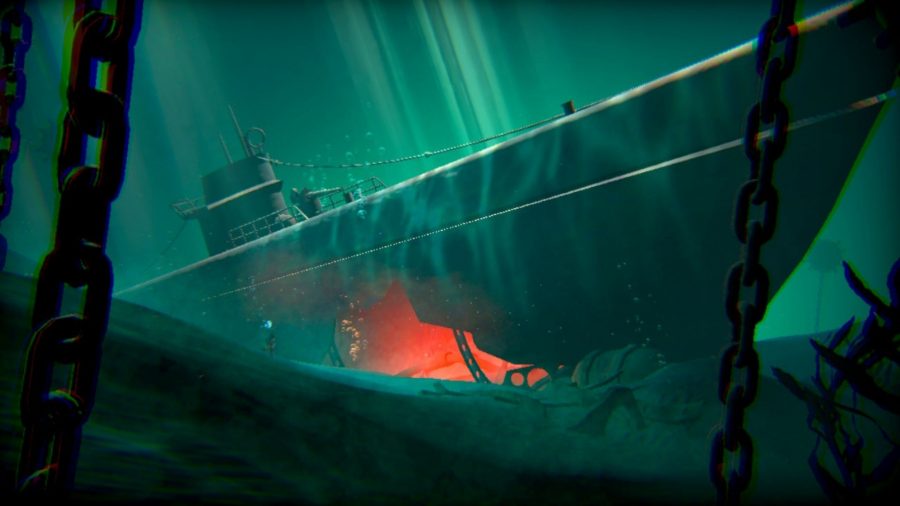
The sheen eventually begins to wear off, however, and by the time you’ve played a handful of the nine episodes available, the game stops surprising you. The same sort of jokes, the same sort of gameplay, and very little in the way of narrative progression all make the middle section a bit of a slog. Sure, you get to see large new vistas, and they’re gorgeously built, but that’s all there is, sometimes. For such a short, charming game, I can’t believe how fed up I felt in the middle of it.
The final few episodes pick up a bit, as the general gets more furious, and you explore underwater caves and low gravity areas of space. The final episode itself is a wonderful way to tie everything up, and is done in a heartwarming way without being cheesy. It’s just a shame that it takes such a long time of not much happening to get there.
There’s also a new additional episode alongside this console release, which encapsulates all the issues I have with Little Orpheus. Here, there are gorgeous skies to explore, but also the same old unengaging puzzles. The dialogue is amusing again, but not surprisingly so after four hours of similar stuff. There’s a nice mechanical surprise at the end of this episode which I won’t spoil, but I have as many bad things to say about it as I do good.
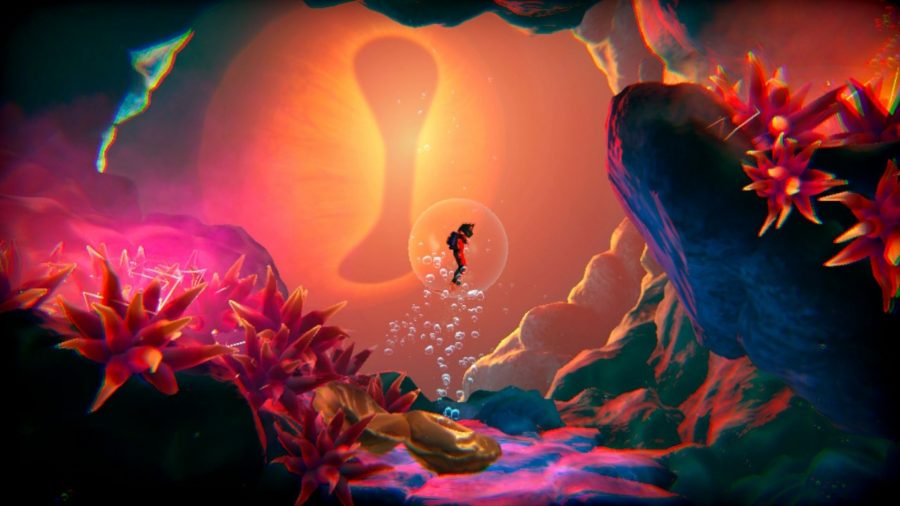
To focus on the positives, Little Orpheus succeeds at building excellent characters, both brilliantly voice-acted by Gunnar Cauthery (Ivan) and Paul Herzberg (the general); captures all its influences in a playful aesthetic, both visually and aurally; and has a lot to enjoy in terms of story and style. And if that’s all you’re after, Little Orpheus is fine. But the puzzles can be so uninspired and the platforming so often consists of doing very little, that it’s hard to strongly recommend.
I think it has something to do with what you’re meant to expect. When I play a walking simulator, I’m fine with having not too much to do, accepting my place as the experiencer of a story and very little else. But when I play a platformer, I expect a level of engagement with the gameplay. And Little Orpheus just doesn’t have it.
